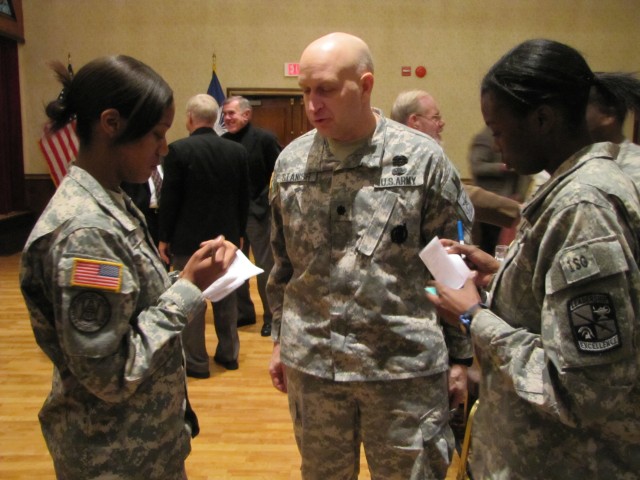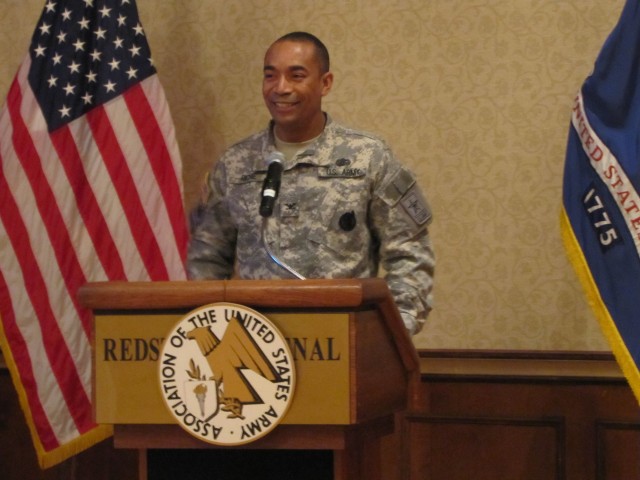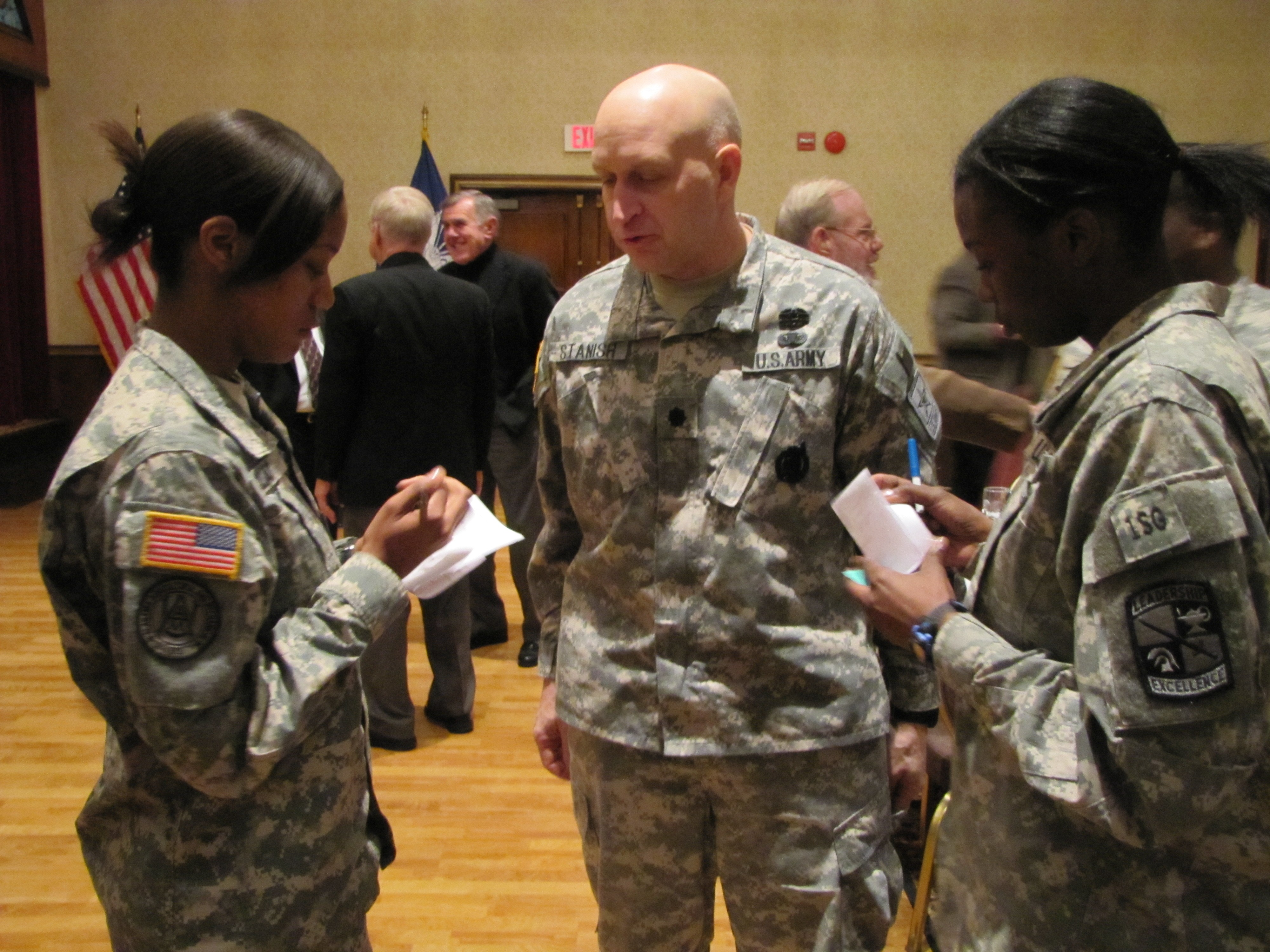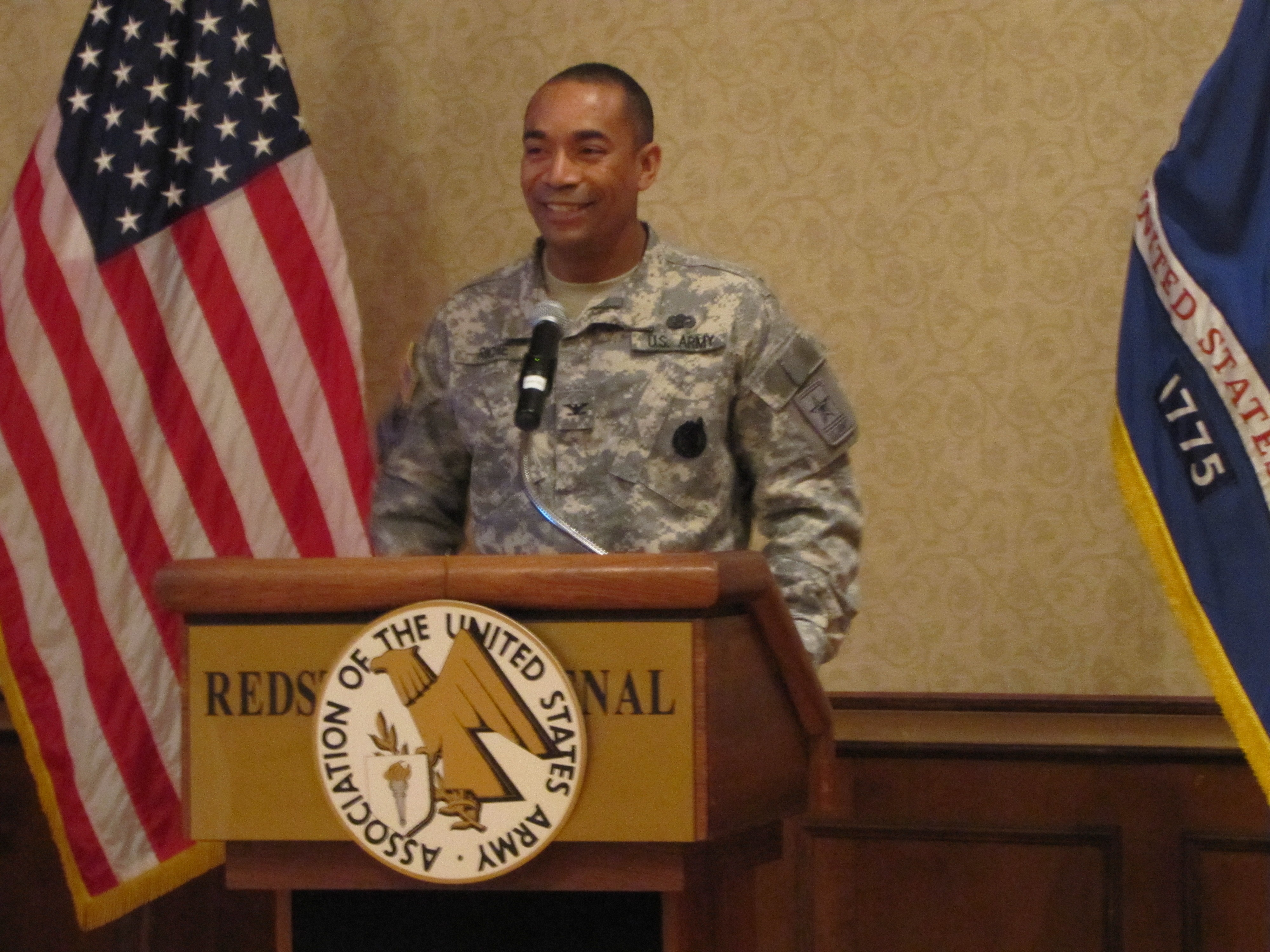REDSTONE ARSENAL, Ala. -- For many teenagers and young adults, the Army can be a "once-in-a-lifetime chance."
That's what it was for Col. Glenn Richie, commander of the 2nd Recruiting Brigade, when he chose the Army as his career path while a college freshman.
"From that one-chance encounter (with a recruiter), I received the opportunity of a lifetime," he said. "I've been blessed to travel the country, and lead some of the best men and women in the U.S. Army."
Richie spoke about the success of the 2nd Recruiting Brigade during a presentation at the Bosses' Breakfast sponsored Feb. 17 at the Officers and Civilians Club by the Tennessee Valley Chapter of the Association of the U.S. Army. In the audience were AUSA members and corporate members, and ROTC students from Alabama A&M University.
The 2nd Recruiting Brigade, now located in its new headquarters at Redstone Arsenal, spans seven states - Alabama, Florida, Georgia, Mississippi, Louisiana, North Carolina and South Carolina - along with part of Tennessee, and Puerto Rico and the U.S. Virgin Islands. It employs 2,000 Soldiers and 200 civilians in eight recruiting battalions consisting of five to eight companies each. Companies include five to eight recruiting stations each.
"We are one of five brigades across the nation that make up the United States Recruiting Command," Richie said. "Our responsibility is to build up the strength of the Army."
The 2nd Recruiting Brigade is known for annually recruiting the most new Soldiers for the Army.
Though the poor economy is a factor that helps Army recruiting, Richie said the success in the 2nd Recruiting Brigade is primarily because of the feelings of "patriotism and outstanding service in the South, and the dedication and hard work of our (recruiting) Soldiers."
In fiscal 2009, the 2nd Recruiting Brigade recruited 24,127 new Soldiers, surpassing its goal of 19,764 Soldiers; and recruited 6,195 new Reservists, surpassing its goal of 5,058 Reservists.
"We achieved 120 percent of our mission," Richie said. "To put it in perspective, 24,000 Soldiers is the size of an Army division."
So far, in fiscal 2010, with numbers reported for October through January, the mission for recruiting new Soldiers is running at 110 percent of the goal. The goal for recruiting new Reservists is at 117 percent of the goal.
Between October and January, the brigade has recruited 7,048 new Soldiers for 2010, surpassing the four-month goal of 6,237 new Soldiers. It has recruited 1,687 new Reservists, surpassing its four-month goal of 1,439.
"This is the first time in the Army's history that we have recruited an all-volunteer Army during a protracted war," Richie said. "We are proud of our Army, your Army and your Soldiers."
Yet, Richie said Army recruiters do face challenges in their mission, with the number one challenge being the number of recruits who can actually qualify for military service.
"The Army recruits a holistic person with good aptitude, physical fitness and morals, and a good legal record," he said. "Fewer than three of every 10 of our young people between the ages of 17 and 24 can fully qualify. They don't qualify because of moral, physical, aptitude and legal reasons.
"And the opportunity only comes once."
Unfortunately, that opportunity passes by about 75 percent of young people between the age of 17 and 24 because they are poorly educated, overweight, have physical or mental ailments, or have been in legal trouble with drug use and criminal records.
"These issues threaten our country's ability to defend itself," he said. "This is a fundamental problem not just for our military but for our country."
Richie said the recruiters' "responsibility and obligation to this country is to find those few qualified for service and make sure they understand their opportunities."
Although the Army offers recruits many career choices, opportunities for career advancement, solid health care, tuition assistance, and enlisted bonuses and loan repayments, it is its outstanding leadership training that makes the most significant long-term difference in the life of a young Soldier, he said.
"Our Soldiers are doing amazing things around the world and they are becoming true heroes," he said. "Ninety-nine percent of our enlistments have high school diplomas. We have a quality force that we are building and sustaining for the Army."
Richie reached out to his audience of AUSA members, asking them to continue their strong support of Soldiers.
"Maintaining the strength of the Army should be an American effort," he said. "Community support is vital in showing young people what the Army has to offer ... There's no job like an Army job. Help us tell the Army story."
Recruiters are particularly looking for young men and women who can serve as officers. He said the Army is looking to high schools to find students who can continue through college and become Army officers. He mentioned two Army programs - the March 2 Success program that offers free test preparation classes at march2success.com and a corporate Partnership to Youth Success program that can be researched at www.armypays.com - that are helping young people make the Army a career.
"The bottom line is we need your support," Richie said. "We need leaders in the community who will reinforce our story, and that can tell young people about how the Army is an honorable profession and a good path to a career."
Besides Richie, Lt. Col. Walt Stanish, commander of the 2nd Medical Recruiting Battalion, also told the audience about his battalion's success in surpassing its recruiting goals with quality recruits.
"Our programs pretty much sell themselves," he said, as he reviewed the scholarship and incentive benefits of pursing a medical or nursing degree as a Soldier.
Several of the Alabama A&M ROTC cadets in the audience were encouraged by the presentations made by Richie and Stanish.
"It was very helpful for me," said A&M ROTC cadet Cpl. LeKeisha Bailey. "It made me look at different branches versus just going into the military police branch. It helped me look at my options. I like the opportunity to be able to excel in my Army career as well as continue to go to school."




Social Sharing